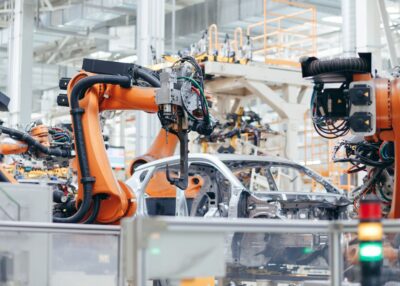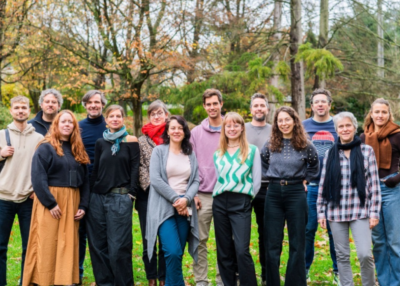
Brussels: fully circular, from pitchfork to fork
Brussels plan to take on 30% of Belgium local fruit and vegetable production by 2035, as defined in its Good Food Strategy. But does the city have it in her to reach such a goal? One thing is for sure, our entrepreneurs are ready to take up the challenge! Here is the story of a Belgian ‘chicon‘ that stayed true to its roots from birth till death.
Agricultural land is limited in Brussels. Only 2% of 268 ha is dedicated to organic farming. To alleviate the agricultural land shortage, Brussels-based companies are – once again – thinking big by capitalizing on unexploited space: mushroom cultivation in cellars, aquaponics on rooftops, vegetable gardens on walls…
Those 100% circular and innovative methods of food production are currently gaining popularity in Brussels. Soon enough, the whole supply chain will join the movement.
Get a comprehensive overview of Brussels circular economy through the companies supported by our circlemade cluster.
Little ‘chicon’, from farm to table
The main focus of Good Food Strategy? Developing a sustainable method of agricultural production to dramatically increase resilience in urban food systems thanks to a sustainable and innovative food production, highly beneficial to environment as well as economy.
Production – in house, from cellar to rooftop
Several innovative methods of food productions have been developed since a few years in Brussels.
Firstly, urban farming aka producing vegetables, fruits and other food items in the city. In Brussels, Smala Farming grows fruits and vegetables on a piece of land located in Anderlecht. Another example is Urban Harvest ; the company grows aromatic herbs in its vertical farm based in Etterbeek. Skyfarms, for its part, helps companies and private individuals creating their own urban vegetable garden.
Aquaponics is a combination of aquaculture (fish farming) and hydroponics (growing plants without soil). Water flowing through the aquaponics system is fertilized by fish waste. The effluent-rich water, containing essential nutrients for plant growth, is then filtered by plants. The cycle is complete. In Brussels, BIGH grows fish and vegetables on the Foodmed rooftop while Aquaponie helps companies and private individuals to create their own aquaponics system.
Finally, fungiculture is the cultivation of edible mushrooms in a fresh and moist environment. And as nothing is lost, everything is transformed, Permafungi and Eclo grow mushrooms in Brussels cellars, on coffee ground for the first and on spent brewery grains/stale bread for the second.
And what about irrigation? Well, who needs artificial fertilizers when Brussels has Fyteko? The biotechnological start-up offers a natural biostimulant called « Nurspray », currently nourishing, inter alia, African and South-American soils.
Distribution – no need to shop too far for a glass jar
Whether our Little ‘chicon’ is from Anderlecht or Etterbeek, he is first and foremost a true ‘Brusseleir‘. As his distributor should be. Thus, more and more mass retailing alternatives are currently emerging.
Bio markets as Barn or Origin’o offer loose and mostly seasonal products, straight from local producers! Roots takes it one step further: the store regularly composts its clients’ organic waste to turn it into a natural fertilizer used by supplying truck farmers. Sounds good, doesn’t it ?
Agricultural cooperatives provide their members with an exclusive access to first-hand local products, as long as they run the store 2-3 hours a month. Like BEES coop or Terroirist, for instance.
In a hurry? Canneries and their handmade products in returnable glass jars are the perfect solution. In Brussels, Pipaillon offers jams, chutneys and marmalades, while BAM! sell sweet and salty product mixes, an healthy and balanced meal choice.
No time for a quick run to the store? E-farmz offers food boxes, organic baskets and products that you can directly order online.
CONSUMPTION – sustainable fast food
Little ‘chicon’ found a buyer! What does the future hold for him?
Will the little guy end up in Refresh kitchens, a sustainable neighborhood canteen? Or will he be cooked au gratin at Boentje café, a zero waste cafe making tasty daily specials…? Or will he end up in one of the oven of BeCook!, a shared kitchen for entrepreneurs working in the food sector?
REUSE – Little ‘chicon’ will become… soup, juice, cracker
Cycles do have a beginning, but no end! Food waste has thus a role to play in circular economy.
- Give your spent brewery grains to Beerfood or MAD LAB for them to make crakers.
- Give your unsold vegetables (like our Little ‘chicon’) to enVie, they will be turned into some soup.
- Give your unsold fruits to FruitCollect or Fruitopia, they will be transformed in juice.
Give Brussels-based companies any challenge, they will turn it into wonderful opportunities: the crème de la crème.
Want to know more about the leading actors of Brussels circular economy?
More on our blog

After Audi: Brussels foreign trade in the first half of 2025
Posted on 28/01/2026
